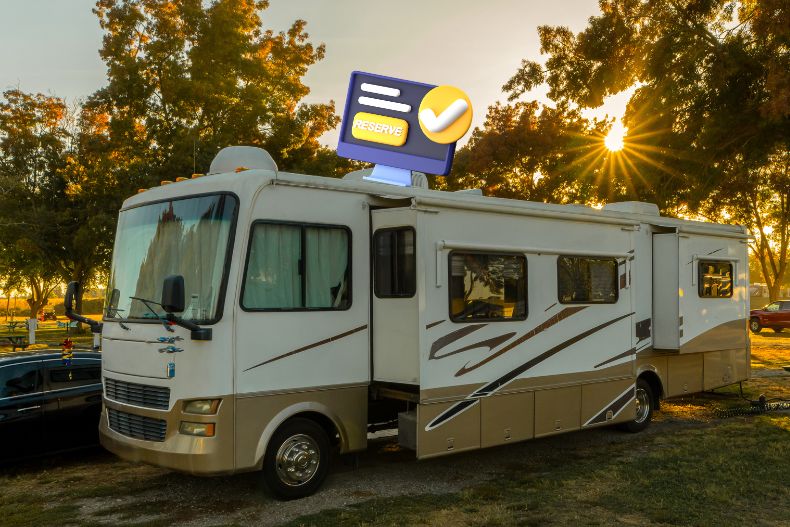Your website acts as the digital face of your RV park, making it essential to present an engaging and professional image. To stand out in today’s competitive market, you need innovative strategies that attract and convert visitors into guests. Here, we will go over five ways to use digital marketing to increase bookings for your RV resort. We will help you create a site that captivates your audience and drives reservations, ensuring your RV park remains a top choice for potential visitors.

Understanding your audience
Understanding your audience is crucial for tailoring your website effectively. Start by identifying the key demographics that typically visit your RV park. Are they families, retirees, or adventure seekers?
Use tools like Google Analytics to gain insights into user behavior—such as which pages are frequently visited and what type of content visitors engage with most. In addition, gather direct feedback through surveys and reviews to better understand their preferences and expectations.
Key strategies to understand and connect with your audience include:
- Identify Demographics: Learn who your guests are—families, solo travelers, retirees, or van-life influencers.
- Monitor Behavior: Use analytics to track which pages visitors spend the most time on.
- Collect Feedback: Read reviews and conduct occasional surveys to identify pain points and preferences.
- Analyze Seasonality: Review visitor patterns across seasons to align promotions and updates accordingly.
- Adjust Website Content: Create blog posts, images, or booking tools that appeal directly to your audience segments.
Designing a user-friendly interface
A user-friendly interface improves the user experience by providing a clean layout, intuitive navigation, and accessible menus. Make sure that your website is mobile-responsive to cater to the needs of visitors who are often on the move. Streamlined booking forms, clear calls to action, and prominently displayed contact information can guide users smoothly through the reservation process. Additionally, fast loading times and easy access to key details like amenities and rates can keep users engaged and more likely to book.
Crafting compelling content
High-quality images and videos can give potential guests a virtual tour of your facilities. Use engaging descriptions to highlight your park’s unique features and amenities, from scenic views to modern conveniences. Testimonials and reviews from previous guests can add credibility and create a sense of trust. Regularly updated blog posts or news sections can keep visitors informed about events and updates at your park. By creating content that informs and excites visitors, you can encourage them to choose your RV park over competitors.
Incorporating SEO best practices
Optimize your website using relevant keywords related to RV parks and local attractions to improve your search engine ranking. Use metadata and alt tags effectively so search engines can better understand and index your content. Ensure all images have descriptive alt text and your site’s structure is clear and organized. Create high-quality, original content that answers common questions potential guests might have. Additionally, build internal links to guide visitors to important pages and external links to reputable sites to boost your site’s authority. Updating your content regularly can also help maintain high search engine rankings, keeping your RV park visible to potential guests.
Implementing online booking features
An intuitive booking system enhances user experience by simplifying the reservation process. Ensure the system is easy to navigate, allowing users to check availability and make reservations with minimal effort. Offer multiple payment options to accommodate various preferences, and ensure the payment process is secure to build user confidence. Incorporate features like reservation confirmations and reminders to keep guests informed. Additionally, consider integrating real-time availability updates and booking modifications to provide a seamless experience. By focusing on user convenience and security, your online booking system can help increase reservations and improve customer satisfaction.
Utilizing digital marketing to boost bookings
Leverage social media platforms to connect with a broader audience by sharing engaging posts, running targeted ads, and participating in community interactions. Email marketing campaigns can keep your audience updated on special offers and park news, maintaining their interest and encouraging repeat visits. Consider collaborating with travel influencers or bloggers to increase visibility and reach new potential guests. Pay-per-click (PPC) advertising can drive immediate traffic to your site by placing your ads in front of users searching for RV parks. Retargeting ads can remind previous visitors to complete their bookings. By strategically utilizing digital marketing, you can enhance your online presence and attract more reservations.
Analyzing and improving performance
To ensure your website continues to perform well, it’s essential to regularly analyze how visitors interact with it. Website analytics help you track key metrics such as visitor behavior, conversion rates, and bounce rates.
Regularly reviewing this data allows you to identify areas that need improvement and better understand which pages or features are working well.
Here are effective strategies to monitor and improve your site’s performance:
- Track Key Metrics: Use analytics tools to monitor traffic sources, time on page, exit rates, and conversions.
- Run A/B Tests: Compare two versions of a webpage or feature to see which one leads to more engagement or bookings.
- Monitor User Feedback: Reviews and surveys can reveal what guests love—and what frustrates them—about your site or booking experience.
- Refresh Content: Update outdated photos, text, and promotions to keep your site relevant and appealing.
- Stay Updated with Industry Trends: Watch what competitors are doing and follow trends in travel and digital marketing to stay competitive.
Frequently Asked Questions (FAQs)
What should I include on my RV park homepage to make a strong first impression?
Your homepage should immediately convey what makes your RV park special. Include a captivating headline, high-quality photos, a brief overview of amenities, a visible “Book Now” button, and quick links to availability, rates, and contact information. Make sure it loads fast and looks great on both desktop and mobile.
How do I handle reservation cancellations and policy communication on my website?
Be transparent by including a dedicated page or section outlining your cancellation and refund policies. Use clear language and update it regularly. Consider adding FAQs or a chatbot to help visitors quickly find answers to policy-related questions before booking.
Should I integrate third-party review platforms on my website?
Yes, showcasing reviews from trusted platforms like Google, TripAdvisor, or Yelp can build credibility and trust. You can either embed reviews directly or highlight selected testimonials with a “Read More” link to the full review page. Always keep them current and relevant.
Final Thoughts
Creating a website that drives RV park reservations isn’t just about having an online presence—it’s about delivering a seamless, engaging, and user-friendly experience that turns visitors into guests. By understanding your audience, designing with usability in mind, crafting compelling content, optimizing for search engines, and integrating powerful digital marketing and booking tools, you’re building more than a website—you’re building trust and convenience.
Consistent analysis and refinement ensure your site continues to perform at its best. When done right, your RV park website becomes one of your most powerful tools for growth.
Start implementing these strategies today to elevate your online presence and fill your reservation calendar faster than ever.
Ready to take your digital presence even further?
If you’re curious about how cutting-edge technology is reshaping user engagement and online learning, explore our article on AI Agents and the ‘Era of Experience’: A New Paradigm for Learning. Discover how these innovations can inspire new ways to connect with your audience and elevate your RV park’s digital strategy.











